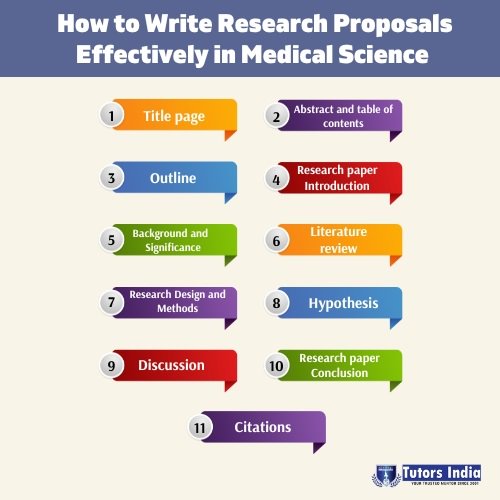How to Write Research Proposals Effectively in Medical Science
In brief
A research proposal intends to persuade people that your topic is valuable and that you have the skills and work plan necessary to finish it. Regardless of your chosen study topic and approach, the research proposal must generally answer the following questions: What you want to achieve, why you want to achieve it, and how you intend to do it. This blog’s goal is to draw attention to the key ideas, not to go into great depth on the subject.
Introduction
Leading research proposals are necessary to secure support for the fundamental and medical sciences. The capacity to effectively compete for peer-reviewed research funding is crucial for developing and maintaining scientific programs in a period of declining earnings. The best way to acquire the fundamentals of “grantsmanship” is to see and participate in grant preparation, yet the training environments most physicians encounter often emphasize clinical abilities. Most doctors never work in a research methodology setting; thus, they never gain grant writing skills. As a result, many clinical studies, even ones created by experienced physicians and dealing with significant clinical issues, frequently fail to outperform those created by fundamental scientists. This gives the impression that research review committees do not positively perceive clinical trials. The contrary is probably more accurate; funding for excellent clinical research is a top priority for research review committees (Terrell 2022).

In the meantime, capable medical experts draft NIH-funded study proposals. Only the top 20% of NIH grant applications are funded due to the rigorous quality standards. Therefore, the researcher must be competent to conduct the study, and preliminary data should be supplied to show that the research is possible and will address the issues posed. Finally, research questions must be hypothesis-driven.
1.Preparation of the Investigator for a Proposal
- Training of the Investigator
Writing the research proposal must show the investigator’s track record of success. As the investigator’s education and profession develop, this expectation rises. Publications from earlier research are not required because fellowship offers do not need prior research experience. Outstanding recommendation letters, undergraduate and medical school success, and associated accomplishments are particularly critical at the fellowship level.
- Mentor
Another crucial factor in rewards given to fellows and young faculty is the mentor’s caliber. The research proposal preparation is strengthened by the involvement of excellent coinvestigators, collaborators, and consultants in addition to the mentor.
- Environment
The best research is done in a friendly, collaborative setting. Clinical and fundamental scientists alike are under growing pressure to complete their studies as quickly as possible due to the evolving nature of the clinical practice.
2. The Research Proposal
No matter if the proposal is sent to the NIH, FAER, IARS, or another funding source, it must meet specific standards in order to be considered sound.
- Abstract
The significance of the topic and the general subject should be discussed in the abstract, with the hypothesis and any significant preliminary findings. The abstract should include providing a summary of the intended techniques.
- Body of the Grant
I. Specific Aims
II. Beginning with the specific aims
III. Background and Significance
IV. Preliminary Data
V. Methods
3. Insights into the Reviewer’s Perspective
Writing a literature review research grant requires careful consideration of the reviewer’s viewpoint. Significant Ness, strategy, and practicality are important factors that reviewers consider.
- Significance
First and foremost, is the investigator posing a critical question? There are two broad ways in which research projects might be noteworthy. The first is to demonstrate clinical significance, and the second is to elucidate fundamental mechanisms underlying disease or biological processes.
- Approach
The reviewer determines if the study strategy supports or contradicts the stated hypothesis.
- Feasibility
The investigator must persuade reviewers that the technique adopted is feasible. The best proof of viability comes from preliminary data (Wong P 2008).
Conclusion
A well-trained investigator who meticulously prepares a hypothesis-driven research proposal is required for successful funding submissions. The reviewers on FAER and IARS research committees are generally investigators and practising anesthesiologists. These reviewers recognize the value of clinical research and eagerly support high-quality clinical trials(Schwinn et al 1998). Although descriptive clinical studies appeal to practising doctors, clinical research must be guided by testable hypotheses from a scientific standpoint. However, clinical research cannot satisfy the criteria of sufficient importance without a tested hypothesis.
About Tutors India
We offer research proposal writing services at Tutors India, where you can relax and stay stress-free because an experienced researcher is handling the work. In addition, we would provide an executive summary/abstract, free articles for writing the research proposal, a Gantt chart, ethical form filling, filling your proposal in the university template format, and a reflective log or diary to accompany your proposal.
Conclusion
That is why experts in medical thesis writing emphasize the significance of selecting the correct topic for your thesis. Through your medical thesis, you must be able to solve a true problem or group of problems. Choose a topic that interests you and where you may add a new viewpoint through your research study (Greenfield et al 2016)(2).
About Tutors India
We also help you produce a whole medical dissertation, from the introduction to the recommendations, including time management. Tutors India’s US and UK writers aim to instil knowledge in students and instill confidence in them so that they can successfully submit their research work, such as Public Health Policy Analysis, a case study of an organization, the study of a specific intervention or event, secondary data analysis, meta-analysis, systematic review, reflection based dissertation, and so on.
References
- Terrell, Steven R. Writing a proposal for your dissertation: Guidelines and examples. Guilford Publications, 2022.
- Wong P. How to write research proposal. International network on Personal meaning. Available at www.meaning.ca/archives. Accessed June 18, 2008.
- Schwinn, Debra A., Elizabeth R. DeLong, and Steven L. Shafer. “Writing successful research proposals for medical science.” The Journal of the American Society of Anesthesiologists 88.6 (1998): 1660-1666.

 Previous Post
Previous Post Next Post
Next Post